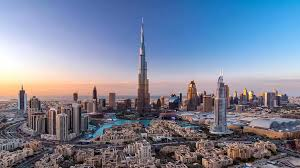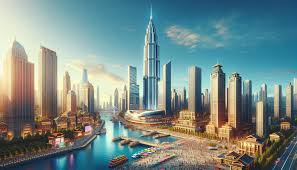
Dubai, once known mainly for its oil and real estate industries, is rapidly transforming into one of the world’s top innovation destinations. From smart cities to artificial intelligence and green technologies, Dubai’s focus on innovation hubs is not just a modern trend—it is a crucial pillar that could shape its economic future for decades to come.

For many years, Dubai and the wider United Arab Emirates (UAE) depended heavily on oil revenues. However, government leaders realized that this model was not sustainable in the long run. Oil is a limited resource, and global markets are pushing towards clean energy. As a result, Dubai started to shift its economic strategy toward knowledge, technology, and innovation-driven industries.
Today, less than 1% of Dubai’s GDP comes from oil. The government’s “Dubai Economic Agenda D33” is targeting to double the size of the economy in the next decade—focusing heavily on innovation, technology, and global partnerships. Innovation hubs are at the heart of this plan.

Innovation hubs are spaces designed to support new ideas, startups, and tech-driven companies. These hubs offer co-working spaces, access to investors, training programs, and connections to global markets. They attract the brightest minds—engineers, designers, business leaders, and tech experts—to build solutions for the future.
Dubai has created some of the most successful innovation hubs in the Middle East. Examples include Dubai Internet City, Dubai Science Park, and Dubai Silicon Oasis. These hubs are home to global giants like Google, Microsoft, and Facebook, as well as hundreds of startups from various sectors like fintech, healthtech, AI, robotics, and green energy.
Dubai’s innovation hubs are expected to generate thousands of high-skill jobs in the next decade. As the world moves toward digital services, cybersecurity, AI, and clean technologies, Dubai wants to make sure its workforce is ready. By providing a platform for startups and global tech companies, the city is ensuring that local talent gets trained and hired for future industries.
Foreign investors love Dubai’s innovation hubs. With tax-friendly policies, a strategic location between East and West, and world-class infrastructure, Dubai is becoming a top destination for venture capital and corporate expansion. In 2023 alone, Dubai attracted over $2 billion in tech-focused foreign direct investment (FDI), much of it through its innovation districts.
Relying on one or two sectors (like oil or tourism) can be dangerous for any economy. Dubai’s innovation hubs are helping diversify the economy into many future-proof sectors—such as biotechnology, space research, sustainable energy, and financial technology. This ensures that Dubai will remain economically stable even if global trends shift.
Dubai’s leadership wants the city to be one of the top 10 global cities for innovation. By building world-class hubs and supporting research and development, Dubai aims to compete directly with cities like San Francisco, Singapore, and London. The city’s futuristic projects—such as flying taxis, AI-powered public services, and green buildings—are already attracting international media and investor attention.
Dubai’s government plays a very active role in developing these innovation hubs. Initiatives like Dubai Future Foundation, Area 2071, and Expo City Dubai (the legacy site of Expo 2020) are clear signs of long-term commitment. The government offers startup visas, financial support, and low-cost office spaces to new businesses willing to base themselves in these hubs.
The Dubai Silicon Oasis Free Zone, for example, offers tax exemptions, 100% foreign ownership, and fast-track licensing for tech companies. These incentives make Dubai more attractive compared to other cities competing for the same global tech investments.
Of course, the path is not without challenges. Dubai needs to ensure that it keeps developing local talent and avoids depending too heavily on foreign workers. Education and skills training will be key. Additionally, maintaining a healthy environment for small and medium-sized startups—who often compete with big tech companies for resources—will also be important for long-term growth.
Cybersecurity, data privacy, and global market competition also pose risks that Dubai must manage carefully as its innovation economy grows.
Despite these challenges, most experts agree that Dubai is on the right track. Reports from international organizations like the World Economic Forum and the International Monetary Fund highlight Dubai as one of the fastest-growing innovation centers globally.
With the right balance of government support, private investment, and talent development, Dubai’s innovation hubs could very well be the engine of its economic future—creating jobs, wealth, and technology solutions that shape the region and the world.
Dubai’s future will not be written by oil or real estate alone—it will be shaped in the modern labs, coworking spaces, and tech campuses of its innovation hubs. As the world moves towards AI, renewable energy, and digital services, cities that lead in these sectors will also lead in economic power. Dubai clearly intends to be one of these cities.
By focusing on innovation, Dubai is not just preparing for the future—it is building it.
Read More:- Shobha Realty Launches Its Most Luxurious Project Yet—Full Details Inside 2025
